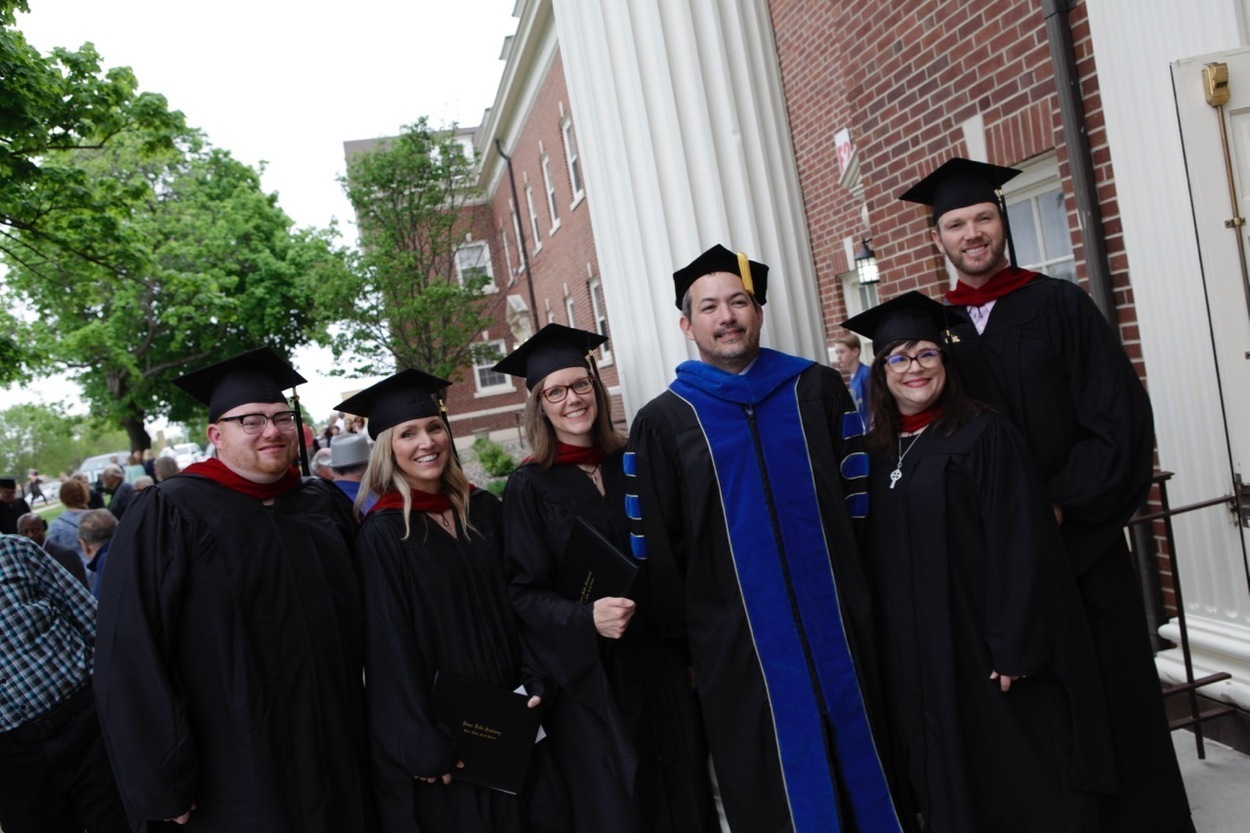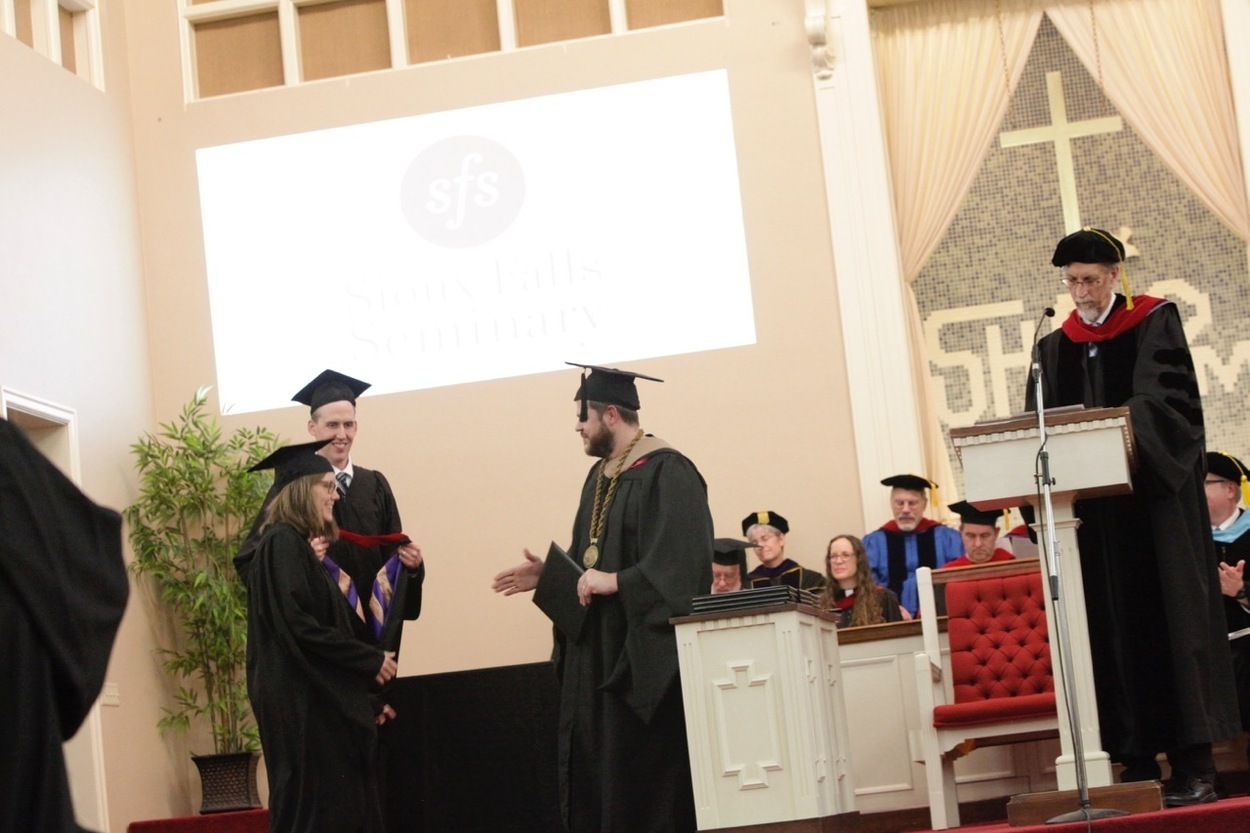
Kairos partnership celebrates graduates, ends first year

Recent graduates with their professor, left to right, Thomas Carlson, Mary Hughes, Michele Slott, Professor Rev. Steve Trefz, Jeanne Sortland, and Paul Kimball. Photos courtesy of Michele Slott.
May marks the end of the first year of a partnership between Sioux Falls Seminary and Garrett-Evangelical Theological Seminary, to share resources, helping students meet ordination requirements through the Kairos Project, which began in 2014. The pilot, which began with a goal of reaching 20 students at a time, currently has 38 students and is still growing in the program.
Thomas Carlson, Mary Hughes, Paul Kimball, Michele Slottt, and Jeanne Sortland celebrated the completion or near completion of their Master of Divinity degree in a recent graduation ceremony in Sioux Falls, South Dakota.
Pastor Michele Slott, who recently graduated and serves at Rapid City First UMC, reflected on the program and her journey to complete her degree.
When I sat down at my first Kairos Project Intensive in the fall of 2015, I was nervous and wondering what to expect. About 30 of us students from different states, denominations, races, and generations sat around tables in a classroom at Sioux Falls Seminary and were welcomed to this new program. Half the students were from the first cohort, that had begun in 2014. President Greg Henson reminded us (as he did nearly every time after that) that it was a “project.” The name was intentional, and the program would be continually changing as they tried to develop the right hybrid of distance learning program to meet all their goals. Those were, to my recollection, to be affordable; adaptable and relevant to one’s ministry context; and flexible in time, to allow for the student’s other parts of life.
The structure of the program is based on nine different outcomes, each with a different focus (spiritual development, biblical studies, cultural awareness, coherent theology, etc.) to build students holistically as leaders in the faith. Assignments within the outcomes are adaptable and able to be combined to work within the student’s own ministry or work setting. Instead of writing a research paper that is suggested, a student might do an outreach project and record a short video talking about how they planned, what they did, and what resulted.

Michele receives her diploma.
More traditional online classwork is also offered with hard deadlines, a professor and other students you interact with regularly. This too may encourage you to do that outreach project, but in a different way. Platforms like Moodle may be used where you take in recorded lectures, read texts, then interact with classmates by answering the professor’s questions about course material, and respond to each other’s forum posts. Alternatively, it may be a weekly online class with reading, lectures, and papers assigned, plus the professor and students meet via Zoom online each week to have class and discuss the material.
A critical component of the program is mentor teams. Each student has a faculty mentor, a ministry mentor, and a personal mentor, three people investing in their lives for the long haul. The faculty mentor helps students stay on course with the requirements to graduate and stay true to their denomination’s structure and theology. The ministry mentor has a strong awareness of the student’s ministry context and provides encouragement in that area. The personal mentor is a sounding board and wake-up call for the student keeping their connection with God. These three people have a profound influence on the development of the student.
Another critical component is the twice-yearly gatherings. The ability to get together face-to-face with other students, share the journey of seminary education, encourage one another and come together in worship as a community of new and emerging leaders is life-giving and much needed in the process.
One of the challenges of the Kairos Project is that because it is constantly changing, and exponentially growing, there are just issues that come with that. When something is never finished, it never gets to the point of perfection. It’s a struggle sometimes for students, staff, and mentors to try to remain as adaptable as the program is. Each iteration of the project, though helps it work better to achieve its goals through those students, faculty, and mentors.
I was one of 54 Kairos students who graduated in May 2019 from Sioux Falls Seminary. A few of us have a few boxes to check off before we are fully done, but we are closing in on it.
“Messy but possible,” is what my friends and I have said about the Kairos Project. It allows people with complex lives to follow their call and obtain a ministry degree, even when working full time outside the church and raising a family.
Today, there are 425 students in the Kairos Project, involving 300 churches, 35 ministry partners, 30 denominations, 30 states, 15 countries, and four continents. Obviously, a lot has happened over the past five years. The hope that comes from this program is how it will educate Christian leaders worldwide for this next generation, and hopefully, generations to come.